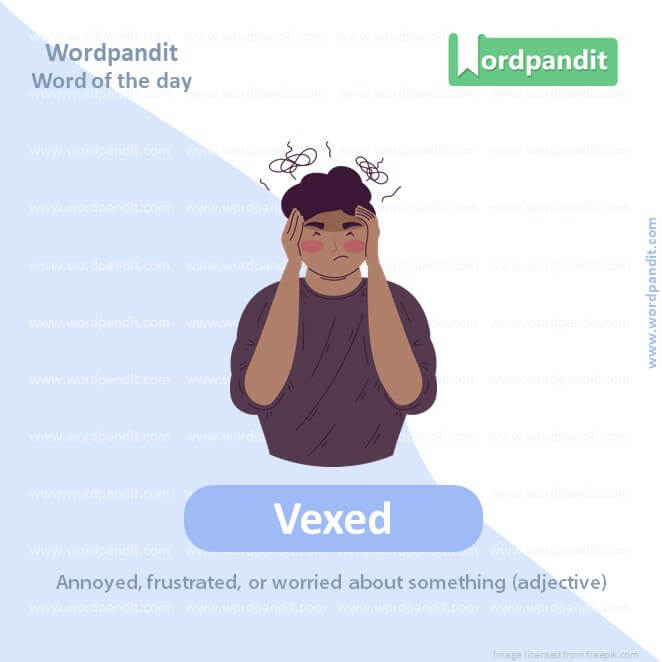Daily Vocabulary Words: List of Daily Used Words in Leading International Newspapers
Hi there. Welcome to this special section @ Wordpandit.
Our endeavour here is very simple: to highlight important daily vocabulary words, which you would come across in leading newspapers in the country. We have included the following newspapers in our selection:
• The New York Times
• The Washington Post
• Scientific American
• BBC
• The Guardian
• Psychology Today
• Wall Street Journal
• The Economist
We are putting in extensive work for developing your vocabulary. All you have got to do is be regular with this section and check out this post on a daily basis. This is your repository of words that are commonly used and essentially, we are posting a list of daily used words. Hence, this has significant practical application as it teaches you words that are used commonly in leading publications mentioned above.
Visit the website daily to learn words from leading international newspapers.

WORD1: Monopolize
CONTEXT: At least they respected our country enough to try to monopolize its symbol.
SOURCE: New York Times
EXPLANATORY PARAGRAPH: Imagine you have a box of crayons, and you decide that only you can use them, not letting any of your friends draw with them. That’s like monopolizing the crayons. You’re keeping them all to yourself and not sharing.
MEANING: To take complete control or possession of something, often in a way that prevents others from having access to it (verb).
PRONUNCIATION: muh-NAH-puh-lahyz
SYNONYMS: Dominate, Hog, Control, Occupy, Corner
USAGE EXAMPLES:
1. She tends to monopolize the conversation during meetings.
2. The company was accused of trying to monopolize the industry.
3. He monopolized the TV remote all evening.
4. Attempts to monopolize the market were thwarted by new regulations.

WORD2: Cavorted
CONTEXT: who scorned Ukraine’s desperate fight for its independence — cavorted in the Kremlin.
SOURCE: New York Times
EXPLANATORY PARAGRAPH: Imagine you’re jumping and dancing around in the backyard, feeling very happy and energetic. That’s like cavorting. It’s when you’re moving around joyfully and without care.
MEANING: To jump or move around in a lively manner, showing happiness or excitement (verb).
PRONUNCIATION: kuh-VOR-ted
SYNONYMS: Frolic, Dance, Prance, Romp, Capers
USAGE EXAMPLES:
1. The children cavorted in the sprinklers on a hot summer day.
2. Puppies cavorted in the park, chasing each other.
3. She cavorted on the beach at sunset.
4. The party guests cavorted to the music.

WORD3: Vexed
CONTEXT: There is perhaps no more vexed question in the world than how this might play out in Israel and Palestine.
SOURCE: New York Times
EXPLANATORY PARAGRAPH: Imagine you’re trying to solve a really hard puzzle, and it’s making you feel frustrated because you can’t find the right piece. That feeling is being vexed. It’s when something is bothering you a lot and making you feel upset.
MEANING: Annoyed, frustrated, or worried about something (adjective).
PRONUNCIATION: vekst
SYNONYMS: Irritated, Annoyed, Agitated, Bothered, Disturbed
USAGE EXAMPLES:
1. He was vexed by the delay in the project’s completion.
2. The unresolved issue remained a vexed question for the committee.
3. She felt vexed at the lack of communication.
4. His cryptic message left me feeling somewhat vexed.
WORD4: Interloping
CONTEXT: an increasingly rigid set of ideas about the interloping colonizer and the Indigenous colonized.
SOURCE: New York Times
EXPLANATORY PARAGRAPH: Imagine if someone who wasn’t invited suddenly joined your birthday party and started eating the cake. That person would be interloping, which means they’re joining or getting involved in something where they’re not wanted or don’t belong.
MEANING: Intruding or interfering in a place or situation where one is not wanted or does not belong (verb).
PRONUNCIATION: in-ter-loh-ping
SYNONYMS: Intruding, Trespassing, Meddling, Invading, Encroaching
USAGE EXAMPLES:
1. The locals viewed the newcomers as interloping in their community events.
2. She didn’t appreciate him interloping in her personal affairs.
3. Wildlife often find themselves interloping in urban areas.
4. Laws prevent companies from interloping in certain markets.

WORD5: Solemnly
CONTEXT: one nation solemnly promised to a second nation the country of a third.”
SOURCE: New York Times
EXPLANATORY PARAGRAPH: Imagine you’re making a pinky promise with your best friend, and you’re both very serious about keeping that promise. When you promise something very seriously, you’re doing it solemnly. It means you’re not joking around and you’re very sincere.
MEANING: In a serious and sincere manner (adverb).
PRONUNCIATION: SAHL-uhm-lee
SYNONYMS: Seriously, Gravely, Earnestly, Soberly, Dignifiedly
USAGE EXAMPLES:
1. The judge solemnly declared the court in session.
2. They solemnly swore to keep the secret.
3. The ceremony began with a solemnly sung anthem.
4. He solemnly promised to return.

WORD6: Alacrity
CONTEXT: Eventually our conversation came around to Fanon, whose writings on political violence are now once again in vogue, taken up with alacrity by the activists focused on undoing settler colonialism — even, or perhaps especially, if it requires bloodshed.
SOURCE: New York Times
EXPLANATORY PARAGRAPH: Imagine your mom says you can have ice cream if you clean your room, and you start cleaning really fast because you’re excited about the ice cream. That quickness and eagerness to do something is called alacrity.
MEANING: Eager and enthusiastic willingness (noun).
PRONUNCIATION: uh-LAK-ri-tee
SYNONYMS: Eagerness, Enthusiasm, Readiness, Zeal, Promptness
USAGE EXAMPLES:
1. She accepted the offer with alacrity.
2. The volunteer showed great alacrity in helping out.
3. His alacrity to learn new things impressed his teachers.
4. They packed their bags with alacrity, excited for the trip.
WORD7: Inferiority
CONTEXT: It frees the native from his inferiority complex and from his despair and inaction; it makes him fearless and restores his self-respect.”
SOURCE: New York Times
EXPLANATORY PARAGRAPH: Imagine you’re drawing a picture, but you think your friend’s drawing is much better than yours. You might feel like your drawing isn’t as good. That feeling of not being as good or important is called inferiority.
MEANING: The condition of being lower in status or quality than another (noun).
PRONUNCIATION: in-feer-ee-AWR-i-tee
SYNONYMS: Subordination, Subjugation, Secondary, Lesser, Submissiveness
USAGE EXAMPLES:
1. She struggled with feelings of inferiority at school.
2. The team’s inferiority was evident in their performance.
3. He overcame his sense of inferiority to achieve his goals.
4. The product’s inferiority to its competitors was clear.
WORD8: Contrition
CONTEXT: “Their complete lack of contrition and remorse borders on pathological.”
SOURCE: New York Times
EXPLANATORY PARAGRAPH: Imagine you accidentally broke your friend’s toy and you feel really, really sorry about it. That feeling of being sorry and wanting to make things right is called contrition. It shows you understand you did something wrong and feel bad about it.
MEANING: The state of feeling remorseful and penitent for having done something wrong (noun).
PRONUNCIATION: kun-TRIH-shuhn
SYNONYMS: Remorse, Repentance, Regret, Penitence, Guilt
USAGE EXAMPLES:
1. He expressed deep contrition for his actions.
2. Her contrition was evident in her apology.
3. They accepted his contrition and forgave him.
4. The criminal showed no contrition during the trial.
WORD9: Incompetent
CONTEXT: Trump posted, “because we have an incompetent president who is weak and doesn’t understand what the World is thinking.”
SOURCE: New York Times
EXPLANATORY PARAGRAPH: Imagine trying to make a sandwich but instead of putting the ingredients inside the bread, you put them outside. Someone might say you’re not doing it right because you don’t know how. Being incompetent means not having the skills or knowledge to do something properly.
MEANING: Not having the necessary skills or abilities to do something successfully (adjective).
PRONUNCIATION: in-KOM-pi-tuhnt
SYNONYMS: Unskilled, Incapable, Inadequate, Inept, Unqualified
USAGE EXAMPLES:
1. The report was poorly done, showing the team’s incompetence.
2. Despite his efforts, his incompetence in cooking was obvious.
3. They replaced the incompetent contractor.
4. The accident was caused by incompetent driving.
WORD10: Seemingly
CONTEXT: I noticed a seemingly bizarre subplot emerge: skin cancer in Israel.
SOURCE: New York Times
EXPLANATORY PARAGRAPH: Imagine you see clouds in the sky and think it’s going to rain, but it doesn’t. The clouds made it seem like it would rain, but they were misleading. Seemingly means something appears to be a certain way, even if it’s not actually that way.
MEANING: Appearing to be something, especially when this is not the case (adverb).
PRONUNCIATION: SEE-ming-lee
SYNONYMS: Apparently, Ostensibly, Outwardly, Superficially, Evidently
USAGE EXAMPLES:
1. It was seemingly impossible, yet they succeeded.
2. The problem was seemingly solved, but it reappeared.
3. She was seemingly unaffected by the news.
4. The path was seemingly clear, yet obstacles were present.
vocabulary classes
In today’s multicultural world, knowledge is your greatest asset. And in this pool of knowledge, one arena that often goes underestimated is ‘vocabulary classes’. Most people limit the concept of vocabulary to knowing a few fancy words. However, it is much more; it’s about giving you the key to express your thoughts, feelings, and ideas more effectively.
Firstly, let’s examine why vocabulary classes are essential. When you take vocabulary classes, you’re essentially equipping your linguistic arsenal with words that allow you to articulate your messages more accurately. A well-developed vocabulary means not only knowing a multitude of words but also being able to utilize them in the appropriate context, thus enhancing your communication skills.
Now, how should we approach learning in vocabulary classes? The process of expanding your vocabulary should not be stressful. The best approach is to incorporate playfulness, curiosity, and active engagement. Incorporate reading, writing, listening, and speaking activities that are sourced from various contexts – books, movies, podcasts, discussions, and debates.
One important principle to remember when taking vocabulary classes is repetition. Repeated use of new words in different contexts will reinforce their meaning and solidify them in your memory, reducing the chance for forgetfulness.
Moreover, let’s not forget the role of technology in vocabulary classes. There’s a variety of applications and online platforms that have revolutionized the way we learn new words. They offer interactive classes, quizzes, games, and other engaging resources that make the learning process fun and effective.
In summary, vocabulary classes serve as a potent tool for enhancing your communication skills, and expressing your ideas confidently and clearly. Whether you are a business professional, student or just looking to improve your language abilities, vocabulary classes are amongst the best investments you could make. You not only learn new words but get the confidence and tools to wield them effectively.







